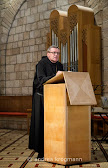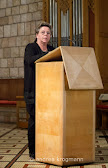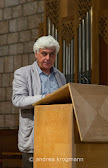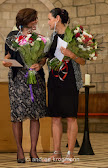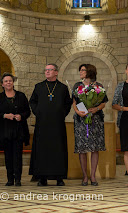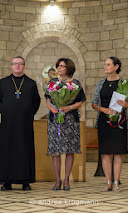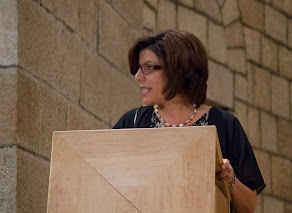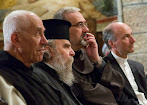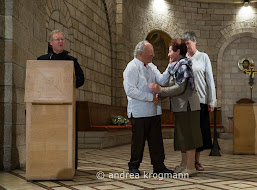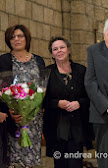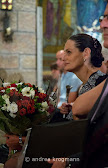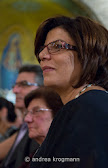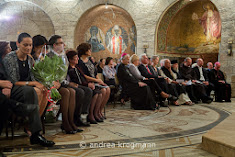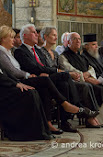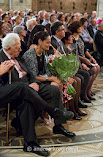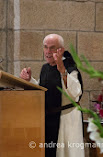At St. Thomas More Church in San Francisco she proposes "flower power" rather than "power of fire"
Mother
Agnes Mariam of Syria joined 400 people representing many nationalities and
ethnicities--Syrians, Egyptians, Lebanese, Iraqis, Armenians, Jordanians,
Palestinians, Israelis, Filipinos, Americans, Latinos--for an ecumenical prayer
service at St. Thomas More Church in San Francisco on Sunday, Nov. 3.
Ten
priests and pastors, from the heads of Christian communities who serve
Middle Eastern groups in the Bay Area (the Greek Antiochean Orthodox, Greek Jerusalemite
Orthodox, Armenian Orthodox, Armenian Congregation, Maronite, Greek Catholic,
Latin Churches) collaborated in the preparation this event and were in
attendance.
Also
in attendance were choirs and soloists from the Latin [Roman Catholic]
Church, Greek Orthodox Church, the Maronite Church, the Armenian Church, and
the Greek Catholic Church.
Following the
prayer service which began at 5:30 PM, Mother Agnes delivered her speech, summarized below, and then answered written
questions. Paul Larudee facilitated the Q/A section.
Musalaha or Reconciliation
Mother Agnes spoke about the Reconciliation
initiative and her humanitarian work in Syria as head of the International
Support Team for "Musalaha" ("Reconciliation" in Arabic) in
Syria.
She began with a moving introduction about the
terrible fate of the Middle Eastern populations constantly harassed by
sectarian violence to leave their homeland. She spoke as the daughter of a
Palestinian refugee.
She shared the history of her discovery of the 6th
century monastery of Saint James the Mutilated in Qara, 90 km north of
Damascus, where she has been restoring the ruins and building an international
community open to interfaith dialogue and hospitality.
She pointed out how she shifted from a heinous
position against Syria--due to the occupation of Lebanon, her homeland, by the
Syrian Army--to a compassionate adoption of the Syrian people in the tragedy of
the conflict that is devastating the country. She affirmed she is so committed
to the Syrian people that she applied for Syrian citizenship.
A grassroots movement that is apolitical and non-religious
The apex of her speech was the Reconciliation
message. She explained that Mussalaha (Reconciliation) is a grassroots movement
that is present in all parts of Syria and is apolitical and non-religious; it
is a pure brand of the Syrian genuine culture of openness and brotherhood.
She gave moving examples of forgiveness and
reconciliation in Syria where individuals and communities are tearing down the
walls and building bridges of communication, negotiation, dialogue, and
reconciliation.
She spoke of Abu Fayad, a government employee, as a hero of this
movement. Abu Fayad’s only son Fayad was abducted in Homs as a retaliation for
being a Sunni working with the local administration. After several months, the
abductors contacted him to remit to him his son. In fact, they brought Fayad’s
corpse, terribly tortured and cut in pieces. Abu Fayad proclaimed publicly his
forgiveness of the murderers of his only son, and he asked the different
belligerent parties of Al-Waar neighborhood in Homs to forgive one another for
the sake of Syria.
Mother Agnes described her reconciliation
activity and explained how she is working with supportive environments within
the opposition, in places like Moadamiya or Al-Waar as compared to the “non
supportive environments” in Raqqa or Aleppo.
She explained that her Reconciliation activity
compels her to visit all belligerent parties: the rebels as well as the
loyalists.
She explained that she has to coordinate her
activities with the Syrian central administration just as all the International
Organizations that are accepted by the Syrian Government (International Red
Cross, World Food Program, World Health Organization, UNICEF etc…) must.
Mother Agnes pointed out the difficulty of
remaining a credible mediator in reconciling different parties. Each party has
the suspicion that the mediator is siding with the other party.
Nevertheless, the achievements of the
Reconciliation initiative are evident.
She explained the impressive achievement of the
evacuation of 7,000 women and children from Moadamiya, the besieged rebel
neighborhood in West Ghouta through a direct visit to the rebel military
council and the Syrian Air Intelligence headquarters. She underlined the
willing surrender of 550 men who were not allowed by the negotiations to be
evacuated. Among them were more than 220 former fighters. She said it was a
miracle of the Reconciliation spirit that the Air Intelligence forces did not
retain anyone for more than few hours. These former rebel fighters are now in a
rehabilitation center served by the ISTEAMS who will propose a program of
non-violent opposition training with the help of US based peace activist NGOs.
She finished with a message to the US
administration from the beautiful city of San Francisco: Why not to use
"Flower Power" instead of the power of fire? She asked the USA to
favor Reconciliation in Syria and to stop fueling violence.
Statements of Mother Agnes:
1)
I have no political statement to declare, I am not a politician; I
am a mediator for Reconciliation.
2)
My convent is under Free Syrian Army control, and I have a very
good relationship with them; they protect us.
3)
I meet with all kinds of people from the loyalist and the
opposition sides--with ministers, security officers, armed opposition leaders
or popular committees militias. I have go from one place to another,
many times under threat or danger, to negotiate with all of them for
humanitarian issues to spare the bloodshed and to alleviate the conditions
of besieged areas.
4)
I mediate for the liberation of abductees and detainees. We
try to help the different Syrian populations: Sunni, Shia, Christian,
Alawite, Druze, etc. "I tell you that reconciliation is happening
between the different factions of the Syrian people. Many armed
leaders are meeting through the good offices of Mussalaha".
5)
The different factions (the Syrian administration and
different opposition groups who are many times fighting against
each other) want me to take sides with them and denounce the others. I
cannot take any side. I am not a politician; I am a cleric. I work for
humanitarian needs and stand with the civilians. I am with the Syrian
people. "It is so difficult to be in the middle. You are
accused by all parties." I denounce al kinds of genocide and killing
by any party. I cannot accept the killing of any human being. Killing should
stop and and foreign fighters should leave Syria to go back to their countries,
and the supply of weapons should stop.
6)
The Media mainly outside of Syria is against me. They accuse me of
many things that I did not do or say. They pick some words from here and there
and fabricate things. They put my humanitarian work in danger because the
fighters read these words and become angry for things I did not say and
positions I did not take.
7)
I am compelled and invited to explain myself outside of Syria, and
I meet with many different people of different views and persuade them
with evidence and with kindness and they change their positions and join us in
supporting Mussalaha..
After
the speech, the audience asked diverse questions, which Mother Agnes answered
with clarity and kindness. Paul Larudee served as moderator.
A video was taken by a person in the audience, and he promised to
send Msgr. Kobti a copy. When the latter obtains the copy, he will disperse it
widely.
People
then were invited for refreshments in the parish hall.
Msgr. Labib Kobti's Welcome Speech
As pastor of St. Thomas
More Church and in fraternal friendship with my colleagues-- priests,
pastors and leaders of churches, communities, and organizations--I welcome
all of you present here.
Today we gather to pray
for truth, justice, and peace to prevail in the Middle East, the place that is
the homeland of our faith, where our faith started, and from where our
ancestors brought it all over the world.
Prayer is our
heritage--yours and mine--for, indeed, prayer is the way our ancestors in faith
dealt in difficult times and with Death. They gathered around our saints
in mountains and caves, in sanctuaries and in the desert, in public places and
in safe houses; they gathered to pray.
They blessed and forgave
their persecutors; they called for reconciliation and love; they honored their
martyrs, and they persevered in the Land. We are the sons and daughters of
these people of faith.
Today our church leaders
at home and here of varying religious, ethnic, and social backgrounds call
upon us to emulate our ancestors in faith. It is through prayer that we learn
how to forgive, how to build and rebuild, and how to love, reconcile and
continue to exist.
As Christians and
Muslims trusting in the one God, the only one, holy, merciful and whose real
name is love, we are charged with being a sign and symbol to
the whole world as a people of the Middle East who lived in harmony
for centuries and built together as Christians and Muslims our
national entities and home countries mainly Egypt, Syria, Iraq, Lebanon,
Jordan, Palestine as well as many others.
May our prayers unite
our hearts and souls again today, and may we proclaim that love,
forgiveness, and reconciliation are the solution to the chaos and violence we
witness here on earth, whether in the Middle East or in other places.
And so, Brothers and
Sisters, I thank you for coming to join us in prayer.

